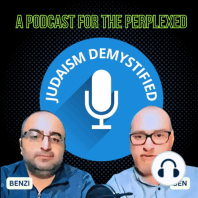82 min listen

Episode 39: Professor Menachem Kellner "Maimonides' Confrontation with Mysticism"
FromJUDAISM DEMYSTIFIED | A Guide for Today's Perplexed: Confronting the Challenges of This Generation
Episode 39: Professor Menachem Kellner "Maimonides' Confrontation with Mysticism"
FromJUDAISM DEMYSTIFIED | A Guide for Today's Perplexed: Confronting the Challenges of This Generation
ratings:
Length:
91 minutes
Released:
Jan 17, 2023
Format:
Podcast episode
Description
In his book 'Maimondes' Confrontation with Mysticism', Professor Menachem Kellner presents the vision and values that Maimonides promoted in his understanding of Judaism, as well as the proto-Kabbalistic cultural climate he campaigned against and tried to uproot. Additionally, no area in Judaism is as fundamental or more essential than Halakha. Kellner provides the framework for Maimonides’ characterization of the institutional value and purpose of Halakha. This is crucial to understanding the larger context of Rambam’s conception of Jewish ideals. Another important topic is Holiness, which has become a buzzword in Judaism today. We use this word loosely and without much thought going into its actual meaning. Nowadays we attach it to people, places and objects with a sort of assumed “intrinsic” quality. In the time of the Rambam this mistranslation of Kedusha as "holiness" was a widespread phenomenon, an idea Rambam tried to refine. We discuss what holiness meant in the Rambam’s time, and how he polemicized against these sorts of misconceptions. Similarly, the Hebrew language has long been thought of as the “holy tongue,” to the point that there is a belief that certain words have power (amulets, etc.). What was the Rambam’s understanding of the Hebrew language against the cultural backdrop of his time, and how does that jive with today’s mystical obsession with letters and words? Also, Angelology is probably the most challenging concept to comprehend. The idea creates problems in various ways from biblical anthropomorphism, intermediaries, independence of a spiritual entity, and so on. How did the Rambam reshape the concept of angels in light of the dearth of seemingly mixed messages about angels that pre-existed the Rambam’s time? Lastly, some scholars and laymen who have read Kellner's book have come away with the impression that his portrayal of Maimonides depicts him as the “anti-mystic” philosopher. Said differently, Kellner's focus on Maimonides' polemics against mysticism implies he did not believe in mysticism in any capacity. Is this characterization true? Does Kellner really believe that the Rambam completely rejected mysticism in every sense or that there's a dichotomy of Rambam the philosopher and Rambam the mystic? We discuss Hakham Jose Faur's phenomenal book Homo Mysticus, which leaves no doubt that Rambam was both a philosopher and mystic, as it showcases Rambam as carrier of the Maaseh Merkaba tradition.
Released:
Jan 17, 2023
Format:
Podcast episode
Titles in the series (93)
Episode 3: Rabbi Dr. Joshua Berman "A Critique of Biblical Criticism" by JUDAISM DEMYSTIFIED | A Guide for Today's Perplexed: Confronting the Challenges of This Generation